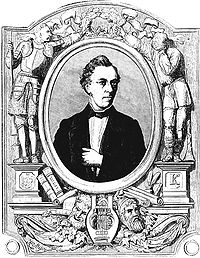This is an old revision of this page, as edited by Logologist (talk | contribs) at 06:11, 17 March 2007 (Cat.). The present address (URL) is a permanent link to this revision, which may differ significantly from the current revision.
Revision as of 06:11, 17 March 2007 by Logologist (talk | contribs) (Cat.)(diff) ← Previous revision | Latest revision (diff) | Newer revision → (diff)
Władysław Syrokomla (Belarusian: Uładzisłaŭ Syrakomla, Уладзіслаў Сыракомля) was a pseudonym of Ludwik Władysław Kondratowicz (Ludźvik Uładzisłaŭ Kandratovič, Людзьвік Уладзіслаў Кандратовіч, 1823-1862), a Belarusian and Polish poet, writer and translator.
Syrokomla was born September 29, 1823 in the village of Smolhów in what is now Belarus, to an impoverished szlachta family. Between 1833 and 1837 he attended the prestigious schools in Niaśviž and Navahradak, but had to give up his studies due to financial problems. After that he started to work as a clerk in the Radziwiłł family lands manager's office.
In 1844 he published the first of his poems under the pen-name Władysław Syrokomla, coined after the coat of arms of his family. The same year he also rented a small village of Załucze. In 1853 he sold it and rented the village of Borejkowszczyzna near Vilna (Vilnius). There he became one of the authors of the Kurier Wileński, the biggest and the most prestigious daily newspaper published in the area of Vilna. In his prose he supported the liberation of peasants and secession of the lands of former Polish-Lithuanian Commonwealth from the Imperial Russia that annexed them in the effect of the Partitions of Poland. For taking part in various anti-tsarist demonstrations in 1861 he was arrested by the Okhrana and then sentenced to home arrest in his manor in Borejkowszczyzna. He died September 15, 1862. He was buried in the Rossa Cemetery in Vilna.
Among the most notable of his works are translations of various Russian, French, Ukrainian, German and Latin poets, including works by Goethe, Heine, Lermontov, Shevchenko, Nekrasov, Béranger and others. Ever since his translations are considered one of the best pieces of translated poetry in the history of the Polish language.
